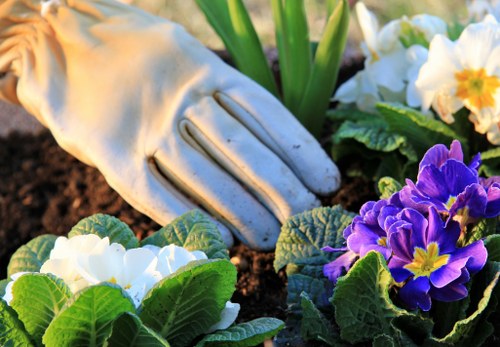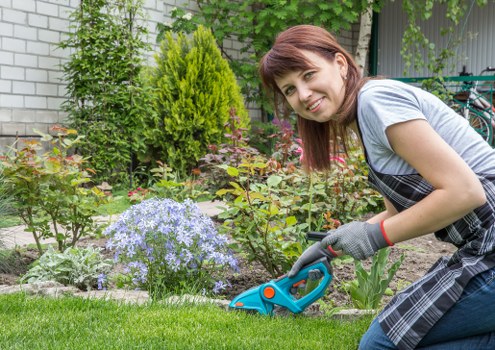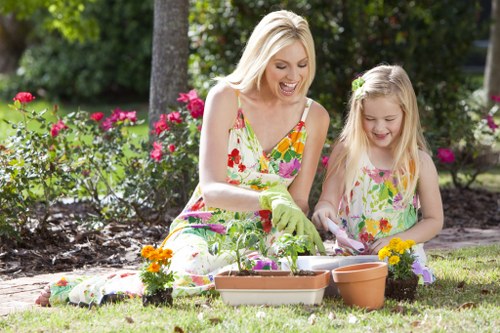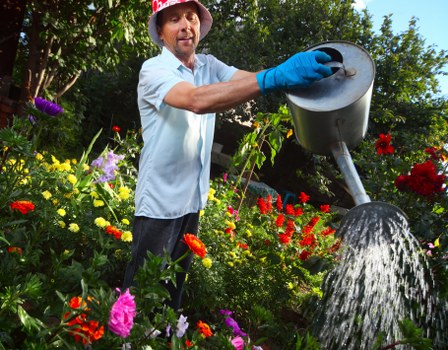Expert Garden Maintenance in Queens Park: Nurturing Your Outdoor Spaces
Introduction to Garden Maintenance Queens Park

Queens Park is not just an area on the map—it is a community that values the natural beauty of outdoor spaces. Garden maintenance in Queens Park plays a vital role in keeping these spaces healthy, vibrant, and welcoming. Whether you are a homeowner or a local business, cultivating a well-kept garden can be a source of pride and relaxation.
In this article, we will explore the ins and outs of garden maintenance, offer practical tips, and show you how proper care can transform a garden into an inviting oasis. We also understand the importance of local character and community in Queens Park, which is why our discussion extends to local trends and neighboring regions.
Our goal is to provide expert insights on garden maintenance while ensuring the content remains inviting and accessible to everyone. We will use simple language and offer clear directions, ensuring that even those new to gardening can find valuable advice.
Understanding Garden Maintenance: The Basics

Garden maintenance involves various tasks that keep your landscape healthy and attractive. From regular mowing to seasonal planting, every detail counts. In Queens Park, specific conditions like local climate, soil type, and native flora mean that maintenance must be both thoughtful and proactive.
One key aspect is proper watering. Excessive or insufficient water can damage plants, and with Queens Park's changing seasons, proper irrigation is essential. Many experts recommend using sustainable water practices to ensure that gardens are eco-friendly.
Another critical element is organic fertilization. Instead of relying on chemical-based products, many locals now turn to organic options to boost soil fertility while protecting the environment. This approach not only enriches the soil but also keeps it safe for children and pets playing nearby.
Specialized Services in Garden Maintenance Queens Park

Specialized garden maintenance services in Queens Park are designed to address both small-scale and extensive garden needs. These services include landscape design, weed control, pruning, and seasonal clean-ups. By engaging professionals, residents can enjoy lush, healthy lawns without sacrificing their time.
Local specialists are well-versed in the unique challenges faced by gardens in Queens Park. Their expertise ensures that every project—whether it is the installation of a new flower border or an extensive tree care regimen—is completed with precision and care. Clients have often remarked on the benefit of partnering with professionals who have intimate local knowledge.
Additionally, these professionals also provide consultations on sustainable practices and eco-friendly solutions. They recommend native plants that are well adapted to the Queens Park environment, ensuring a harmonious balance between nature and design.
Seasonal Adjustments and Garden Trends

Throughout the year, the needs of gardens vary greatly. Seasonal adjustments are essential to keep your garden looking its best. In spring, it's all about renewal—planting fresh species and providing nutrients to wake up the landscape after winter. In summer, maintaining a lush green lawn and protecting plants from intense sunlight becomes a priority.
Autumn calls for preparation for the cold months. This includes trimming, mulching, and making sure that the garden is robust enough to survive the winter. Winter maintenance may involve minimal work but is crucial for preventing damage from frost and harsh weather.
Garden designers in Queens Park are also focusing on trends like xeriscaping and vertical gardening. These techniques not only save space but also adapt to environmental stresses while keeping the beauty intact. The incorporation of smart irrigation systems and energy-efficient lighting has become quite popular, reflecting an increasing commitment to sustainability.
Local Garden Trends and Community Initiatives

Queens Park is known for its strong sense of community and pride in local aesthetics. Various neighborhood initiatives encourage residents to participate in community garden projects. These projects promote teamwork and provide educational opportunities on sustainable gardening practices.
Local community centers often host workshops that cover everything from basic pruning techniques to advanced landscaping ideas. By participating in these events, residents not only learn about plants but also gain insight into the benefits of organic gardening and water conservation.
Strong local ties mean that the best practices in garden maintenance are often shared among neighbors. This neighborly help fosters an environment where new garden ideas and landscaping techniques are continuously evolving. Many homeowners attribute their garden successes to the collaborative spirit of Queens Park.
Why Garden Maintenance is Essential in Queens Park
Garden maintenance is vital in Queens Park as it directly impacts property values, environmental quality, and community spirit. A well-maintained garden is not only aesthetically pleasing, but it also contributes to a cleaner, healthier environment by filtering pollutants and promoting biodiversity. Additionally, beautifully maintained outdoor spaces help in reducing stress and nurturing the mental well-being of community members.
Regular garden care ensures that the landscape remains a safe and welcoming area for families, friends, and neighbors to gather and enjoy nature. When gardens are cared for, they become a hub for local activities, events, and relaxation, enhancing the overall quality of life within the community.
Moreover, garden maintenance can help in tackling issues such as soil erosion, pest infestations, and plant diseases, all of which can compromise the health of your garden if left unaddressed. By taking proactive measures, residents safeguard their investment and contribute to the overall beauty and resilience of the community.
Effective Strategies for Garden Maintenance

Several effective strategies can keep gardens in Queens Park thriving throughout the year. These include routine tasks such as weeding, trimming, and the removal of debris or fallen leaves. These steps ensure that plants receive enough sunlight and air, which are crucial for their health.
Using organic mulch can help control pests naturally while retaining soil moisture. Mulching is a simple yet powerful technique that not only enhances the garden’s appearance, but also supports plant growth.
A balanced irrigation schedule is equally important. While too much water can cause damage, too little can stress plants. Employing smart sprinkler systems that monitor soil moisture can provide a well-regulated amount of water, ensuring optimal growth.
Choosing the Right Garden Maintenance Service

When considering a garden maintenance service in Queens Park, research and local recommendations are invaluable. Companies that deeply understand the region's climate and soil conditions tend to deliver more satisfactory results. Look for professionals who not only offer scheduled maintenance but also advise on the best plants for your garden.
It is essential to partner with a service that listens to your needs and customizes their maintenance plans accordingly. A reliable company will assess your garden's unique qualities and design a schedule that respects both the aesthetic and ecological aspects of your property.
Many service providers emphasize the importance of sustainable and organic practices. These approaches reduce environmental impacts while ensuring that your garden remains a safe haven for wildlife and local fauna.
Maximizing Your Garden's Potential

To maximize your garden’s potential, it is important to set aside time to understand its needs comprehensively. This can include analyzing the plant species, soil composition, and even environmental challenges like pests or seasonal changes. Local garden experts in Queens Park often recommend periodic assessments.
Another important tip is integrating a mix of annuals and perennials. Annuals provide short-lived color and vibrancy, while perennials offer long-term stability and structure. By balancing these, you create an environment that is always in bloom to some extent.
Regularly incorporating organic fertilizer and compost into the soil further enhances its fertility. This practice not only improves plant growth but also strengthens the garden's natural ecosystem, making it more resilient during times of stress.
Essential Tips for Sustainable Garden Maintenance
Sustainability is at the heart of modern garden maintenance in Queens Park. Embracing environmentally friendly practices such as composting, using natural pest repellents, and opting for organic fertilizers are key steps to ensure a garden that is not only beautiful but also sustainable. These practices help maintain the ecological balance and nurture the local wildlife.
Implementing water-saving techniques such as drip irrigation can also reduce unnecessary water use. This is especially beneficial during the hot summer months when precious water resources must be conserved. Smart technology is increasingly available to help monitor and manage water usage efficiently.
Moreover, sustainable garden maintenance involves making choices that protect the health of your soil. This can be achieved by employing crop rotation in vegetable gardens, reducing the use of chemical pesticides, and encouraging natural predators to curb pest populations.
Benefits of Organic Gardening

Organic gardening is an essential part of sustainable garden maintenance. It helps preserve the integrity of the soil and enhances the flavor and nutritional value of garden produce. Many residents of Queens Park have found that organic practices lead to more robust, disease-resistant plants.
Using natural compost and organic matter not only enriches the soil but also continuously nourishes your garden, making it more productive over the long term. The result is a greener, healthier space that benefits both humans and wildlife.
Furthermore, organic gardening reduces the reliance on synthetic chemicals, creating a safer environment for families and pets. It is a win-win strategy for both the ecosystem and your garden’s overall health.
Integrating New Technologies in Garden Maintenance
The rapid evolution of technology has significantly influenced garden maintenance methods. Innovations such as automated watering systems, soil sensors, and garden planning apps are becoming increasingly popular in Queens Park. These tools help homeowners monitor the health of their gardens and optimize maintenance tasks.
Modern technology enables a more precise approach to tasks like irrigation and pest control. These systems can be adjusted easily to cater to seasonal changes and even unexpected weather patterns. By using these tools, residents can save time and effort while achieving a beautifully maintained garden.
For those new to technology, simple smart devices are available that provide real-time feedback on soil moisture and light exposure. The integration of these devices ensures that small details, which might otherwise be overlooked, are given proper attention.
Tips for Implementing Smart Gardening Tools

Implementing smart gardening tools starts with identifying your garden's unique needs. Evaluate the areas where plants may need extra moisture or sunlight and consider investing in sensors that provide real-time updates. These systems offer immediate feedback that can help prevent common issues such as overwatering or under-watering.
Another useful tip is to start small. You don’t have to overhaul your entire garden in one go; introduce a smart sprinkler system or a moisture sensor in one area first, then expand as you become more comfortable with the technology.
Local garden experts in Queens Park have found that a gradual approach not only minimizes disruption but also allows you to tailor the technology to your garden over time. This ensures long-term sustainability and efficient management of your outdoor space.
Local Relevance: Nearby Areas to Queens Park
Queens Park is surrounded by several vibrant areas that contribute to its charm. The local landscape and community spirit extend beyond the park’s boundaries, offering diverse perspectives on garden maintenance and lifestyle. Each neighborhood brings its own flavor to the art of gardening.
Below are some of the closest communities to Queens Park, along with their unique features and proximity relevance:
- East Queens - Known for its colorful flower displays and community garden events, East Queens is just a short drive away.
- West Queens - With its serene lakeside views and sustainable garden practices, West Queens provides innovative ideas for eco-friendly maintenance.
- North Queens - A historical area with charming old gardens, North Queens is celebrated for its timeless landscaping techniques.
- South Queens - Famous for its modern architecture and green spaces, South Queens combines contemporary style with natural elements.
- Queens Garden - The name itself suggests a dedication to horticultural beauty; this area is known for well-cultivated public gardens.
- Riverside Queens - Sharing a border with a scenic river, Riverside Queens offers educational programs in organic gardening.
- Old Queens - This neighborhood boasts historic estates and traditional garden layouts that inspire many local projects.
- New Queens - With rapidly developing residential areas, New Queens features modern landscaping that focuses on low-maintenance designs.
- Queens Meadows - Renowned for its sprawling green fields, Queens Meadows offers insights into large-scale garden care techniques.
- Queens Town - A bustling yet verdant suburb, Queens Town combines urban living with garden tranquility.
- Queens Vale - This area is characterized by its rolling hills and natural beauty, making it a perfect example of sustainable landscape design.
- Green Queens - As the name suggests, Green Queens is dedicated to eco-friendly practices and organic garden care.
- Queens Hill - Overlooking the park, Queens Hill has a mix of both manicured lawns and wildflower patches that add character to the community.
- Queens Court - Known for its quaint streets and community-run gardens, Queens Court is an excellent example of neighborhood collaboration in garden maintenance.
These nearby areas not only enrich the local culture but also provide valuable models of effective garden care. By sharing ideas and resources, residents across these regions contribute to a more vibrant and sustainable environment.
Delving Deeper: Techniques and Best Practices
Maintaining a garden in Queens Park requires attention to a number of different techniques. From basic upkeep tasks to choosing the right plant species, there is an art to creating a garden that flourishes. Here we explore some of these techniques in greater detail.
First, consider the layout of your garden. A well-planned garden takes into account the natural light, soil quality, and water drainage patterns. Using natural borders, raised beds, and pathways can enhance both the beauty and functionality of your garden.
Second, proper pruning is critical. Regular trimming helps promote growth and remove dead or diseased branches, ensuring that your garden remains healthy. Whether you are maintaining a hedge or caring for fruit trees, the principles of effective pruning remain consistent throughout Queens Park.
Integrating Organic Matter for a Healthier Garden

The incorporation of organic matter like compost and manure is a cornerstone of sustainable garden maintenance. Organic matter improves soil structure, promotes beneficial microbial activity, and increases nutrient availability.
Garden enthusiasts around Queens Park have seen transformative results after integrating these materials into their soil. The addition of organic matter can turn dull, lifeless patches into thriving green spaces capable of supporting a variety of plant life.
Using organic fertilizers not only boosts growth but also minimizes the environmental impact compared to synthetic alternatives. This approach aligns with the broader goals of sustainability and ecological responsibility that are highly valued in our community.
Long-Term Planning and Garden Sustainability
Planning for long-term garden sustainability in Queens Park involves foresight and continuous learning. Garden maintenance is not a one-off event—it is an ongoing process that requires regular assessments and adjustments. In this section, we detail strategies to ensure your garden remains vibrant for years to come.
One of the keys to long-term success is diversity. Incorporating a wide variety of plants not only minimizes the risk of pest infestations but also creates a visually appealing landscape. A diverse garden supports many types of wildlife, encouraging a balanced ecosystem.
It is equally important to keep abreast of new trends and technologies in garden maintenance. Attending local workshops, joining gardening clubs, and consulting with experts in Queens Park can help you stay updated on the latest techniques and eco-friendly practices.
Community and Continuous Improvement

The spirit of continuous improvement is reflected in local garden clubs and community projects. Neighbors often share tips and resources, contributing to a vibrant exchange of ideas. This collaborative environment is one of the many reasons why garden maintenance in Queens Park thrives.
Community gardens, in particular, serve as excellent examples of collective effort. They promote the sharing of organic compost, local plant varieties, and even tools. Such initiatives foster a sense of belonging and help residents learn from one another.
Moreover, by participating in these groups, even novice gardeners gain valuable insights that improve their gardening skills. The journey of maintaining a garden becomes a shared experience that enhances the entire community’s well-being.
Future Insights and Trends in Garden Maintenance Queens Park
As technology and environmental awareness continue to evolve, the future of garden maintenance in Queens Park appears promising. Emerging trends indicate a growing emphasis on smart gardening, sustainable practices, and community-based maintenance models.
The integration of artificial intelligence in landscape design, use of eco-friendly materials, and innovations in irrigation technology are setting new standards. These trends are not only expected to improve the efficiency of garden care but also to inspire more residents to engage in outdoor activities.
Experts suggest that future gardens will be much more adaptive. They will incorporate elements like vertical gardens, rooftop oases, and water-saving designs that align with the challenges posed by climate change. This forward-looking approach ensures that the legacy of garden maintenance in Queens Park remains strong and innovative.
Embracing a Greener Future

Residents in Queens Park are increasingly aware of the need to adopt environmentally responsible practices. The move toward a greener future involves choices that protect natural resources and nurture local ecosystems.
From installing solar-powered garden lights to using recycled materials for decor, every small step contributes to a larger environmental impact. This holistic approach to garden maintenance is not just about aesthetics; it is about caring for the planet.
By embracing these changes, the community sets an example for sustainable living. The lessons learned in Queens Park are sure to inspire neighboring areas to adopt similar practices, creating a ripple effect of environmental stewardship.
Frequently Asked Questions
Q1: What are the basic tasks for garden maintenance in Queens Park?
A: Basic tasks include regular mowing, weeding, watering, organic fertilization, pruning, and seasonal clean-ups to ensure your garden remains healthy throughout the year.
Q2: How can I ensure my garden is sustainable and eco-friendly?
A: Use organic fertilizers, natural compost, water-saving irrigation systems, and native plants. Also, consider incorporating smart gardening tools to optimize your efforts.
Q3: Are there local community initiatives for garden maintenance?
A: Yes, Queens Park has several community garden projects and workshops where residents share gardening tips and sustainable practices, strengthening local bonds.
Q4: What services can professional garden maintenance providers offer?
A: Professionals offer services such as landscape design, regular upkeep, pest control, seasonal clean-ups, and consultation on sustainable practices tailored to the local climate.
Q5: How do modern technologies impact garden care?
A: Modern technologies like soil sensors, automated irrigation systems, and garden planning apps enable more precise maintenance, saving time and increasing garden efficiency.

